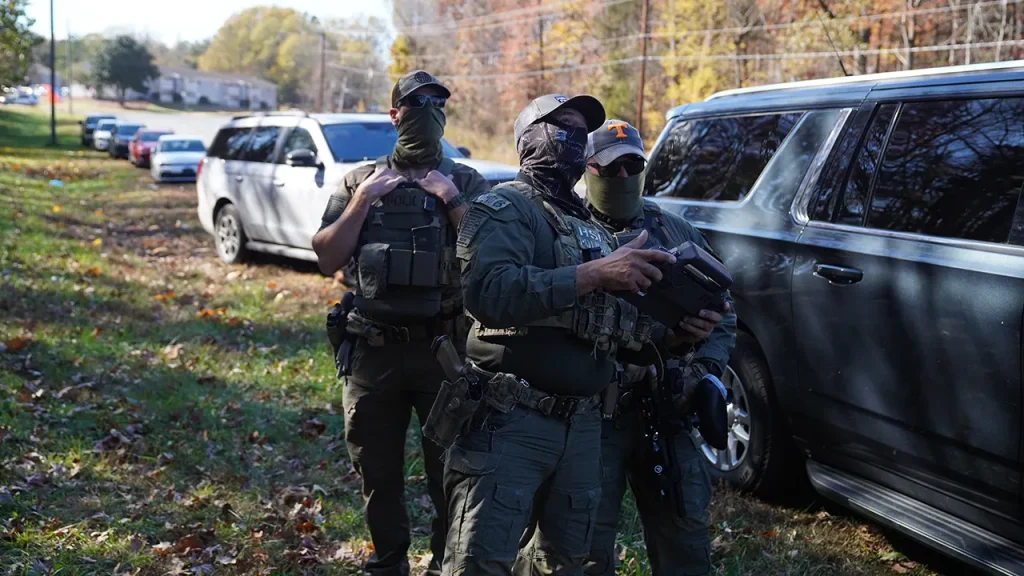Immigration Enforcement in Charlotte Turns Violent
In a tense confrontation that highlights the escalating tensions around immigration enforcement operations, a law enforcement officer was injured Sunday afternoon in Charlotte, North Carolina, when a U.S. citizen allegedly drove a van toward officers and rammed their vehicles. The incident occurred as immigration raids were being conducted throughout the city, part of a broader federal enforcement initiative. According to the Department of Homeland Security (DHS), the driver accelerated his van toward officers in the University City area before fleeing, which led to what officials described as a “dangerous high-speed chase through a densely populated area.” The situation became increasingly hazardous as the suspect attempted to ram law enforcement vehicles during the pursuit, creating what DHS characterized as “a serious public safety threat” to both officers and the general public. The pursuit ended when agents successfully boxed in the vehicle, though not before one officer sustained injuries during the confrontation.
The aftermath of the arrest revealed concerning details about the suspect and the potential for an even more dangerous outcome. After apprehending the driver, agents discovered a firearm inside the van, elevating the seriousness of the incident. DHS officials noted that the individual had a history of confrontations with law enforcement, including prior arrests for “resisting law enforcement, public disturbance and intoxication/disruptive conduct.” This background suggests a pattern of behavior that culminated in Sunday’s dangerous encounter with immigration enforcement officers. The suspect’s status as a U.S. citizen adds a layer of complexity to an operation primarily focused on immigration enforcement, demonstrating how these operations can sometimes involve broader public safety concerns beyond immigration status itself.
This incident unfolded against the backdrop of a significant immigration enforcement operation in Charlotte over the weekend. U.S. Border Patrol agents were observed making arrests throughout the city on Saturday, part of what appears to be a coordinated federal effort. According to DHS Assistant Secretary Tricia McLaughlin, the operation is intended to ensure that “Americans are safe and public safety threats are removed.” These enforcement actions in Charlotte are not isolated but rather part of a series of similar immigration raids recently conducted in several states including California, Illinois, Oregon, and New York, indicating a nationwide intensification of immigration enforcement activities under current federal policy directives.
The Charlotte operations come in the wake of high-profile incidents that have heightened concerns about public safety in relation to immigration. Several months ago, the city was shaken by the fatal stabbing of Iryna Zarutska, a 23-year-old Ukrainian refugee, aboard a Charlotte light-rail train. While DHS has not explicitly connected this specific tragedy to the current enforcement operations, such incidents often influence public perception and policy responses regarding immigration enforcement. The timing and scale of the Charlotte operations suggest they may be part of a strategic response to address both specific local concerns and broader national immigration enforcement priorities, though the exact targeting criteria for these operations remain somewhat unclear from public statements.
The incident in Charlotte reveals the complex and sometimes dangerous nature of immigration enforcement operations in American communities. What began as a routine enforcement action quickly escalated into a high-speed chase through populated areas, endangering not only the officers involved but also potentially innocent bystanders. The presence of a firearm in the suspect’s vehicle underscores the unpredictable risks that law enforcement officers face during such operations. Moreover, the fact that the suspect was a U.S. citizen complicates the narrative around immigration enforcement operations, which are typically portrayed as targeting individuals without legal status in the country. This highlights how these operations can sometimes lead to broader confrontations that extend beyond their primary immigration enforcement objectives.
The Charlotte situation also illustrates the political tensions surrounding immigration enforcement at the local level. Prior to the weekend operations, there had been indications of resistance from local authorities, with some Charlotte officials reportedly promising to resist the pending federal immigration raids, characterizing them as a “campaign of terror.” This reflects the ongoing tensions between federal immigration enforcement priorities and local governance perspectives that exist in many American cities. As these operations continue across the country, they will likely continue to spark debate about the appropriate balance between federal immigration enforcement authority and local community values and priorities. The injury of an officer during this operation will undoubtedly intensify these discussions, as stakeholders on all sides point to the incident as evidence supporting their respective positions on the broader immigration enforcement question that continues to divide communities and policymakers alike.


